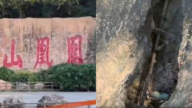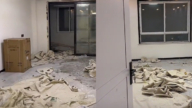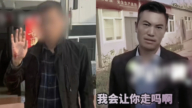【新唐人2013年09月13日訊】最近中國大陸10多名即將畢業的高中生家長,向中共教育部和四川大學發出聯名信,反對高校設置網路「紅客」來監督學生言論,控制學生自由。據了解,自稱為「學校的眼睛,學生的嘴巴」的「網路紅客」是負責監控學生群體的動態,蒐集代表性言論,之後再向學校領導匯報。有評論指出,這個現象代表著中國言論環境的繼續惡化。
北京的《博客天下》9月5號刊登了一篇題為《高校現網路紅客監控校園輿情》的文章。文章說,自從中國大陸全國高校BBS推行實名制以來,出現高校「紅客」組織這種衍生物。「網路紅客」的任務是收集學生言論,反映給學校,同時將學生群體的動向反映給學校。
自由撰稿人劉逸明:「有時候既使校園紅客沒有對你有甚麼舉動,只要很多學生知道有校園紅客的存在,他們的發言就會非常的謹慎,不光是政治言論,既使是對學校的牢騷,也可能遭來學校對他們的報復。」
據了解,一批學生「紅客」參加輿情監控工作,每天對學生微博、貼吧、QQ群的信息跟蹤了解,說是為了所謂的「監控網路輿情,抵制錯誤輿論,維護學校形象」。
劉逸明:「我認為這個現象,是標誌著中國政治環境的繼續惡化,言論環境的繼續惡化,表面上看呢,短時間之內好像可以對中共的政權有正面影響,但長期而言,可能會導致社會矛盾、官民矛盾的進一步加劇。」
孩子正在讀高中的河南維權律師常伯陽認為,「教育」應該是教會公民如何獨立的思考,而不是用意識形態的東西去約束他們。
河南維權律師常伯陽:「現在他們秘密的去監視,這是侵犯了國民的言論自由權利,和批評監督權。再講,有時候可能還會干擾隱私和受到窺探,這種情況都是對國民權利的侵犯,尤其我們認為對學生孩子,他們更需要更多的自由或者獨立思考、獨立發表建言的,現在還在受教育階段就受到這種的管控,我認為就是讓人難以接受。」
常伯陽和其他10名高中生家長,聯名向教育部和四川大學寄出了《關於反對高校設置網路紅客監督學生言論的聯名信》。
評論認為,「網路紅客」對青年學子的壓力肯定是很大的。大陸的學生在學校本來就無法實現真正的學術自由,這個舉措,將會使學生今後的想像力、創造力更差。
另外,《博客天下》文章還提到,自2006年3月,江南大學就成立了由70多名學生骨幹組成的「網路紅客」隊伍,後來擴充至千人。
住在連雲港的大學四年級王同學說,中國的人情味越來越淡薄,加上沒有信仰、道德也不高,如果真的出現這樣的校園紅軍,他相信肯定是給錢的。
連雲港某大學大四同學:「如果不給錢,肯定沒人幹,現在中國的大學生素質哪有那麼高,他不可能免費的給學校或政府做這些事情,現在學生該玩遊戲的玩遊戲,該考研的考研,找工作的找工作,誰有精力去幫偉大的黨和政府做這件事情。」
據了解,除了四川大學以外,還有天津大學、成都理工大學、西南財經大學、南開大學等高校也紛紛成立類似的組織,讓學生參與校園輿情管理。四川大學「網路紅客」組織的副主任在最近的新成員培訓會上自我比喻,「我們是學校的眼睛,是學生的嘴巴。」
9月8號,博客作家鄒思聰在「滾蛋吧,校園網路紅客」的文章中作出回應,他說,如果網路紅客真的有意願去當學生們的嘴巴,那就請退出這個秘密組織,去公開競選兩年一次的學生代表。他還認為,凡是涉及公共事務,就應該透明公開,否則就是侵犯了學生基本權利,毫無正義可言,毫無合法性可言。
採訪/易如 編輯/黃億美 後製/李勇
Online “Red Guards" Monitoring Student Activity is Condemned.
Recently, the parents of many high school students wrote
a letter to the Ministry of Education, and Sichuan University.
The letter was against the university’s online
“Red Guards" that monitor students’ messages.
Sources said that the “Red Guards" claimed themselves
as the “eyes of the university, and mouth of the students."
The “Red Guards" collect students’ events and
speeches, and report to the university leadership.
Commentators said that it continues to
make China’s freedom of expression worse.
On September 5, Beijing’s Blog Weekly
magazine reported about online “Red Guards".
They worked in the universities to monitor
students on-going online messages.
The report said that this has occurred since the
implementation of real name registration online.
Their task is to collect messages and group events, and
pass this information over to the university administration.
Liu Yiming, Writer: “Sometimes, although 'Red Guards'
didn’t do anything, students are aware of their presence.
The students express their opinions very carefully.
The topics of politics or complaints about
their university could be receive retaliation."
Sources said that some students
have joined the “Red Guards".
They monitor students’ daily activity on Weibo, Tieba
(an online forum), and QQ (an instant online message).
They explained that this is to control and reject incorrect
public opinion, and maintains the university’s reputation."
Liu Yiming: “This practice reflects China’s
political environment is continuously worsening.
Superficially in the short-term, it seems
to have a positive affect on the power of
the Chinese Communist Party’s (CCP).
In a long-term, it could create more conflict in society,
and make conflict between officials and civilians intensify."
Chang Boyang, is an activist lawyer in Henan.
His child studies at senior high school.
This educational institution should teach people how
to think independently, rather than bind with ideology.
Chang Boyang: “Now they secretly monitor students,
which violates rights to freedom of speech, and
the right to act as supervisors to the authorities.
Sometimes they interfere with personal
issues, which also violated one’s civil rights.
For young students, they need more freedom,
independent minds and independent speech.
They are still in a learning stage, so it is very
unacceptable to face them with false accusations."
Chang Boyang and another 10 students’
parents sent the letter to Ministry
of Education and Sichuan University.
Commentators believe that online “Red Guards"
brought great pressure to the students.
Students in Mainland China don’t
have much academic freedom.
This move can make students’ ability
of imagination and creativity even worse.
Blog Weekly also mentioned that since March 2006,
Jiangnan University formed 70 online student “Red Guards".
Following this, members increased
to more than one thousand.
Mr. Wang, lives in Lianyungang, and
is a fourth year university student.
He thinks that people’s care towards each other has
declined. They have no belief nor higher morality.
He says that the “Red Guards" are paid for what they do.
Mr. Wang: “Without paying them, no one wants to do it.
Now students don’t have high morals,
and so it is impossible to do it for free.
Students do what they like to do, playing games, preparing
for entrance exam for postgraduate studies, or job hunting.
Who has the energy to do things for the
Chinese Communist Party (CCP) regime?"
Sources said that except Sichuan University,
several universities such as in Tianjin, and Chengdu,
also formed online monitoring management systems.
They let students monitor expression of opinions.
The Deputy Manager of the “Red Guards" in Sichuan
University said in training class, that “we are eyes
of the university, and mouths of the students."
On September 8, blog writer Zousi Cong
responded with an article, “Get out! Red Guards!"
If “Red Guards" intend to be mouths of the
students, please denounce this secret group.
The article called for an open campaign
to establish student representatives.
Zou believes that anything that relates
to public affairs must be transparent.
Otherwise, it violates students’ basic rights.
There is no justice, and no legitimacy at all.





























